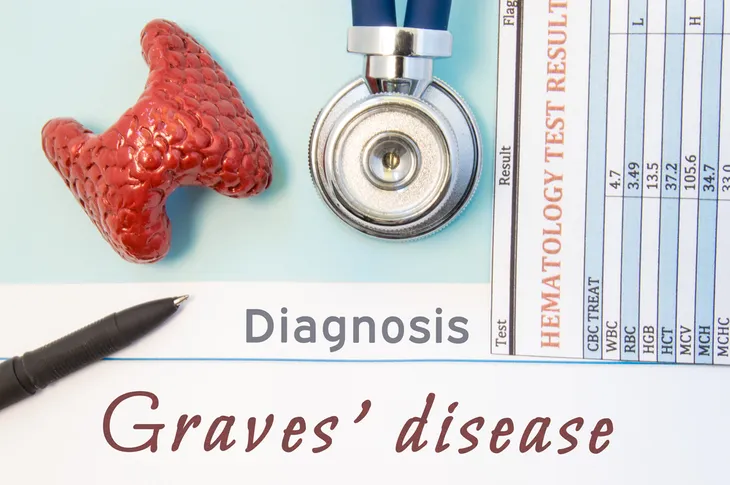A goiter can appear as a swelling in your neck, and can also cause physical sensations such as a tight feeling in your throat, explains the Mayo Clinic. This can lead to difficulty breathing and swallowing, neither of which is very desirable.
Goiters are actually the enlargement of your thyroid gland, which controls many functions in your body. However, now that you know some of the symptoms, here are six reasons you may develop a goiter…
Iodine Deficiency
This chemical element is commonly found in table salt, and it’s also important in the production of thyroid hormones, adds the Mayo Clinic. While sources say this is not a likely cause of a goiter in the developed world (including the U.S.), in the developing world, “people who live inland or at high elevations are often iodine deficient and can develop goiters when the thyroid enlarges in an effort to obtain more iodine,” explains the source.
The clinic notes that iodine deficiency can be further complicated if your diet is rich in “hormone-inhibiting foods” such as cabbage, broccoli, and cauliflower. Try adding safe levels of table salt back into your diet or consult a doctor if you suspect this is the cause.
Graves’ Disease
Endocrine Web explains this disease is actually named after the doctor – Robert J. Graves – that first described it in 1835 in Ireland. The disease is also commonly known in Europe as Basedow’s disease, named after Karl Adolph von Basedow, a German that described it in 1840.
Regardless of the name, it’s referred to by, this disease is an autoimmune condition that drives the thyroid to overproduce hormones (hyperthyroidism). An autoimmune disease is when your immune system turns on healthy systems in your body, which is the reason the thyroid is thrown into overdrive. Of the many symptoms of the disease outlined by the source, a goiter is one of them – specifically a “diffuse thyrotoxic goiter”.
Chronic Lymphocytic Thyroiditis
The American Academy of Family Physicians calls this condition – also known as Hashimoto’s thyroiditis – “the most common inflammatory condition of the thyroid gland and the most common cause of goiter in the United States”.
Also, an autoimmune disease has an opposite effect on the thyroid than Graves’ disease, leading to hypothyroidism (underproduction of thyroid hormones). While this chronic condition is almost exclusively experienced by women (up to 95-percent of cases), it’s also the most common cause of what’s known as sporadic goiter in children, adds the source, which also suggests the rise in cases of Hashimoto’s disease in the past 50-years could be tied to more iodine-rich diets.
Pregnancy
If you’re pregnant, it might not just be your belly growing – your throat may be visibly swelling as well. EMedicine Health explains goiters can enlarge a bit during pregnancy – especially if you’re avoiding milk, eggs, or iodized salt while your baby is developing.
The source explains that not all prenatal vitamins contain iodine, so if you’re relying on these supplements, check the label to be sure. In fact, the source says you should only take prenatal vitamins with iodine content to avoid any complications. A biopsy may be arranged to assess a thyroid nodule before giving birth, it adds. Enlarged thyroids can also appear 3 to 6-months after giving birth, a symptom of Postpartum Thyroid Disease, it adds.
Certain Medications
Like all medications, there could be some unwanted side effects, and a puffy thyroid can be one of them. The Mayo Clinic explains “certain medical treatments” such as the heart drug amiodarone (brand names include Cordarone and Pacerone) and lithium to treat bipolar disorder can be the culprit.
The source adds that exposure to radiation (for medical purposes) in the neck and chest area can also increase your chances of developing a goiter. Exposure to radiation in a nuclear facility can have an equal effect on your thyroid gland.
Cancer
Goiters can be “diffuse,” meaning the entire gland is swollen, or be swollen with smaller bumps (nodules) present. However, keep in mind when you notice enlargement of the thyroid or bumps is not to panic – “most of the time it is not cancer,” explains the American Cancer Society.
In the cases of thyroid nodules, the source notes that only about 2 or 3-cases in 20 are cancerous (that’s about 10-percent). There are variations of cancerous thyroid tumors, with the most common known as Papillary cancer, which tends to grow very slowly, explains the cancer society. While this cancer can still spread to lymph nodes (and consequently throughout your body), the source says it can still be successfully treated and is “rarely fatal”.









